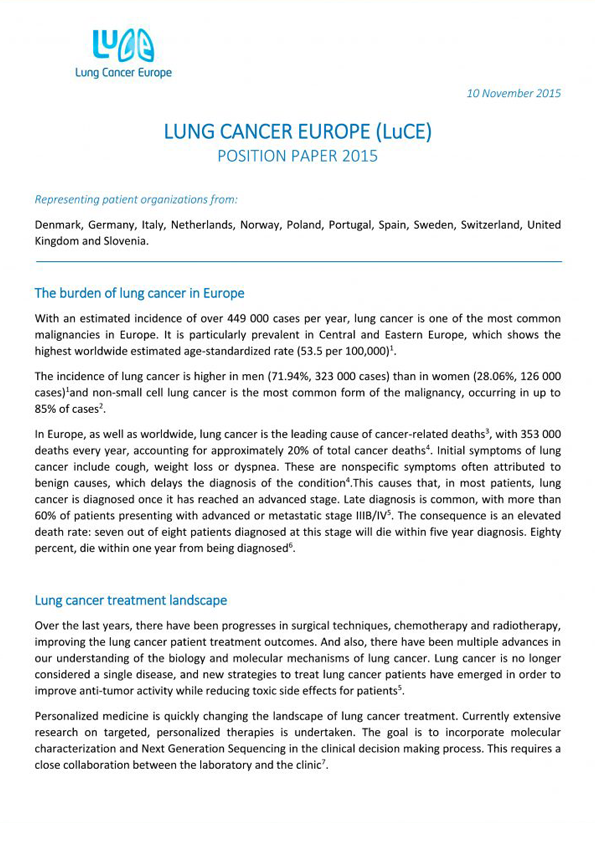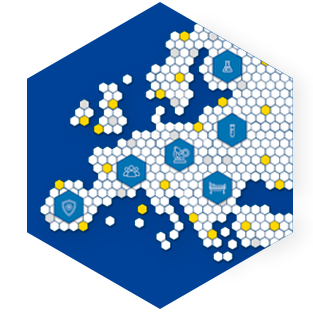
Representing patient organizations from:
Denmark, Germany, Italy, Netherlands, Norway, Poland, Portugal, Spain, Sweden, Switzerland, United Kingdom and Slovenia.
The burden of lung cancer in Europe
With an estimated incidence of over 449 000 cases per year, lung cancer is one of the most common malignancies in Europe. It is particularly prevalent in Central and Eastern Europe, which shows the highest worldwide estimated age-standardized rate (53.5 per 100,000)[1].
The incidence of lung cancer is higher in men (71.94%, 323 000 cases) than in women (28.06%, 126 000 cases)[1]and non-small cell lung cancer is the most common form of the malignancy, occurring in up to 85% of cases[2].
In Europe, as well as worldwide, lung cancer is the leading cause of cancer-related deaths[3] with 353 000 deaths every year, accounting for approximately 20% of total cancer deaths[4]. Initial symptoms of lung cancer include cough, weight loss or dyspnea. These are nonspecific symptoms often attributed to benign causes, which delays the diagnosis of the condition[4]. This causes that, in most patients, lung cancer is diagnosed once it has reached an advanced stage. Late diagnosis is common, with more than 60% of patients presenting with advanced or metastatic stage IIIB/IV5.
The consequence is an elevated death rate: seven out of eight patients diagnosed at this stage will die within five year diagnosis. Eighty percent, die within one year from being diagnosed[6].
Lung cancer treatment landscape
Over the last years, there have been progresses in surgical techniques, chemotherapy and radiotherapy, mproving the lung cancer patient treatment outcomes. And also, there have been multiple advances in our understanding of the biology and molecular mechanisms of lung cancer. Lung cancer is no longer considered a single disease, and new strategies to treat lung cancer patients have emerged in order to mprove anti-tumor activity while reducing toxic side effects for patients[5].
.
Personalized medicine is quickly changing the landscape of lung cancer treatment. Currently extensive research on targeted, personalized therapies is undertaken. The goal is to incorporate molecular characterization and Next Generation Sequencing in the clinical decision making process. This requires a close collaboration between the laboratory and the clinic[7].
Key challenges in lung cancer care
Early diagnosis
Lung cancer is a curable disease if it is detected early enough. The most effective treatment is surgery[8] but this requires early diagnosis. Late diagnosis not only strongly affects survival rates, but it also has an mpact on the quality of life of patients and their caregivers. It also increases the economic costs of lung cancer management.
Avoidable delays in diagnosis occur and, for example, there is evidence that delays in referral from primary care play a part in this[9]. Three lines of action can be undertaken to ameliorate this situation. On one hand, efforts should be made to reduce the time between primary care consultation and the beginning of the treatment[10]. On the other hand, action must be taken to improve awareness and knowledge about lung cancer symptoms among the society, helping the recognition of symptoms in early stages. Finally, another key issue to avoid delayed diagnoses is improving screening and diagnosis program for people at risk.
CALL TO ACTION: the role of the European Commission
Accelerating lung cancer diagnosis is the key to improve treatment outcome and survival rates. This should be faced in a multi-method approach, involving health authorities and other stakeholders.
Promote screening and diagnosis guidelines for lung cancer with evidence-based recommendations. Screening and diagnostic guidelines provide a benchmark for Member States. Benchmarking allows implementing comprehensible and quality-controlled longitudinal screening program for individuals at high risk of development lung cancer, adapted to national healthcare systems. Such guidelines are common practice in the US and have also been implemented in Europe for other cancer types.
Raise awareness and education on the symptoms of lung cancer among the general public. Transnational campaigns will support Member States and health stakeholders inform the public of how to detect first symptoms, leading to earlier diagnosis and, ultimately, better outcomes.
Improved training and knowledge among general practitioners. Because fast referral to a specialist is essential to improve survival and prognosis in patients with lung cancer, primary care practitioners need guidance and appropriate ‘fast referral’ processes to help them recognize signs and symptoms in patients at high risk and make a rapid referral of these patients to appropriate specialists. This rapid referral system has been initiated in other disease areas with significant impact on outcomes for patients.
Access to molecular testing and innovative treatments
Knowledge of tumor molecular diversity has opened a new scenario for lung cancer treatment. New agents and novel strategies for the treatment of this disease have transformed the patient´s outlook in terms of survival and quality of life. Personalized medicine and immunotherapy are holding a promising role in the treatment of the disease, and now molecular testing is becoming an important part of the
clinical decision process.
However, Lung Cancer Europe has registered inequalities in the access to genetic and molecular testing and innovative treatments within and across European countries. These inequalities include differences in protocols for diagnosis and treatment, market access delays, high price of drugs, regionalization of health systems, and differences in the process of assessing innovative therapies. These are the most relevant factors conditioning the quality of lung cancer treatment in Europe
CALL TO ACTION: the role of the European Commission
Molecular testing and analysis of the patient´s genetic background allows personalized treatments that improve prognosis. However, important differences in the access level to new therapies have been observed between Member States, especially in Eastern countries. Lung Cancer Europe supports the rights of patients to access the most effective tests and therapies available.
Lung Cancer Europe encourages the European Commission to:
Ensure the access to molecular testing and novel therapies for patients, developing guidelines for lung cancer diagnosis and treatment, and shortening the time for new drugs to be introduced in Member States.
Collect and publish information about testing and treatment access across Europe.
Stimulate the development and accreditation of lung cancer specialized centers in Europe, allowing more patients to access specialized comprehensive care for lung cancer.
Create a single European System dedicated to the evaluation the benefits of new drugs, with normative capabilities to ensure the availability of drugs approved at European level in all Member States.
Research and development of new medicines
Despite advances in diagnosis and treatment, lung cancer still causes 20% of total cancer deaths. With a 5-year survival rate of 11.2% for men and 13.9% for women, lung cancer is the leading cause of cancerrelated deaths in Europe[4]. Lung cancer is also associated with high associated co-morbidity, which considerably reduces patient´s quality of life[11].
Considering the low rates of survival and the high morbidity, more coordinated research to control lung cancer globally is urgently needed, covering all fields from basic to clinical research.
CALL TO ACTION: the role of the European Commission
Lung Cancer Europe urges public and private actors to engage in basic and clinical research, in an effort to improve survival rates and improve the quality of life of lung cancer patients.
Lung Cancer Europe encourages European Commission to:
Ensure funds continue to be available for research and innovation in the field of lung cancer – thus maintaining its leadership role as a major financial contributor in the fight against lung cancer. This includes the promotion of basic and clinical research projects in the context of Horizon 2020 Program.
Avoid inequalities in access to clinical trials across Europe, and facilitate the movement of European citizens to participate in clinical trials when there is not any specific treatment available in his/her country and this is recommended by a physician.
Strengthen patient involvement in the research & development, providing training and education about this process and promoting partnerships with patient organizations and other stakeholders.
Psychological help
Lung cancer patients and their caregivers are being under a lot of stress. In most cases they are overwhelmed by the diagnosis and have to cope in the new situation which affects their life in many dimensions. They tend to be left alone with the problem.
It is very important to support the patients and their caregivers with the basic psychological help when coping with lung cancer diagnosis and the changes it caused in their life.
It is also crucial to train the doctors on how to talk to patients in such situations. It is very important to be able to build an open relationship between the patient and the medical help, which will affect the effectiveness of the therapy and the psychological health of the patient
CALL TO ACTION: the role of The European Commission
Lung Cancer Europe emphasizes the importance of psycho-oncological help for lung cancer patients and their caregiver. Supporting them by professional help will improve the quality of life of lung cancer patients.
Lung Cancer Europe calls on the European Commission to:
Provide a document stating what the basic help from the national system should consist of.
Ensure funds for training for medical healthcare professionals on how to share information with cancer patients.
About LuCE
Lung Cancer Europe is the voice of lung cancer patients, survivors and their families at European level.
LuCE provides a European platform for already existing lung cancer patient advocacy groups and supports the establishment of national lung cancer patient groups in different European countries where such groups do not yet exist.
LuCE aims to raise awareness about inequities regarding the access to lung cancer treatment and care in Europe. Moreover, it advocates European policies that will lead to improvements in lung cancer prevention, early detection, treatment and care. LuCE also supports national lung cancer patient groups in helping raise awareness for lung cancer among the European public.
References
1. World Health Organization. GLOBOCAN 2012: Estimated Cancer Incidence, Mortality, and Prevalence Worldwide in 2012
http://globocan.iarc.fr/Pages/fact_sheets_cancer.aspx
2. Riessk J. Shifting paradigms in non-small cell lung cancer: an evolving therapeutic landscape. Am J Manag. Care 2013; 19 (19 Suppl): s390-7
http://www.ncbi.nlm.nih.gov/pubmed/24494720
3. Eurostat. Causes of death statistics. 2015
http://ec.europa.eu/eurostat/statisticsexplained/index.php/Causes_of_death_statistics
4. European Respiratory Society. European Lung White Book.
http://www.erswhitebook.org/files/public/Chapters/19_lung_cancer.pdf
5. Gerard C and Debruyne C. Immunotherapy in the landscape of new targeted treatments for non-small cell lung cancer. Mol. Oncol 2009. 3: 409- 424.
http://www.sciencedirect.com/science/article/pii/S1574789109001100
6. Morgesztern D, et al. Improving Survival for Stage IV Non-small Cell Lung Cancer – A Surveillance, Epidemiology, and End Results Survey from 1990 to 2005. Journal of Thoracic Oncology 2009; 12:1524-1529.
7. Hensing T, et al. A personalized treatment for lung cancer: molecular pathways, targeted therapies, and genomic characterization. AdvExp Med Biol 2014;799:85-117.
http://www.ncbi.nlm.nih.gov/pubmed/24292963
8. Kauczor H, et al. ESR/ERS white paper on lung cancer screening. European Respiratory Journal 2015;
http://erj.ersjournals.com/content/early/2015/04/29/09031936.00033015
9. Peake, M. Primary care has a key role in early diagnosis of lung cancer. Guidelines in practice. 2008
http://www.guidelinesinpractice.co.uk/mar_08_peake_lung_cancer_mar08#.VjepoLcvfIU
10. Corner, J. Is late diagnosis of lung cancer inevitable? Interview study of patients’ recollections of symptoms before diagnosis. Thorax 2005;60:314-319
http://thorax.bmj.com/content/60/4/314.full#ref-3
11. Anant M, et al. Quality of life measures in lung cancer. Indian Journal of Cancer 2005; 15: 125-132
http://www.bioline.org.br/pdf?cn05022
12. European Patients´ Academy on Therapeutic Innovation
http://www.patientsacademy.e

